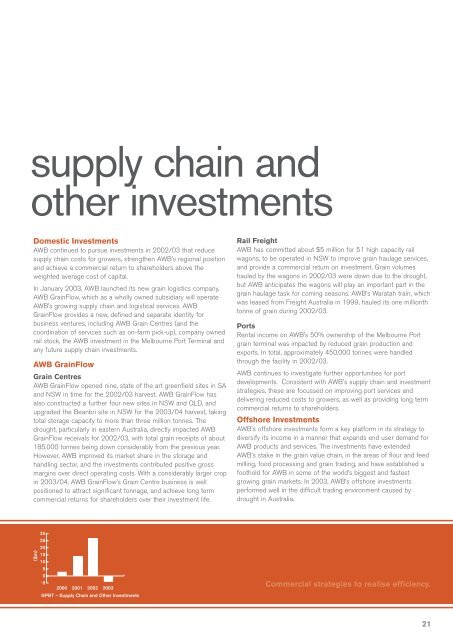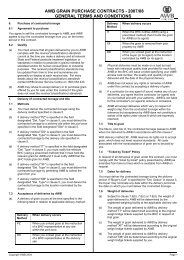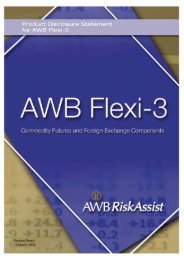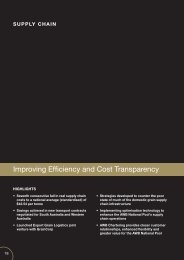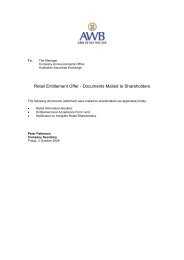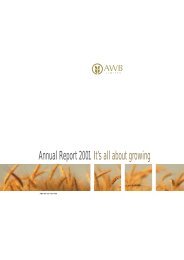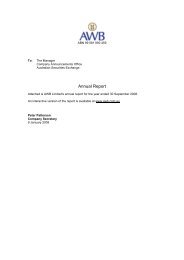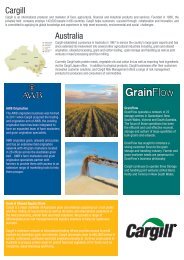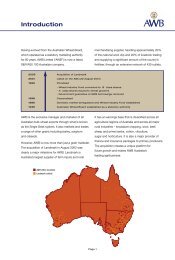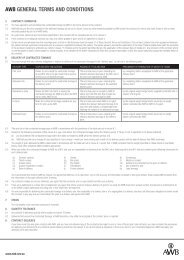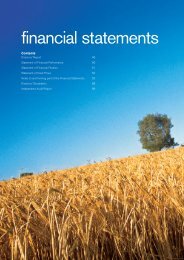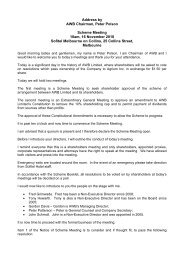AWB Limited - 2003 Annual Report
AWB Limited - 2003 Annual Report
AWB Limited - 2003 Annual Report
You also want an ePaper? Increase the reach of your titles
YUMPU automatically turns print PDFs into web optimized ePapers that Google loves.
supply chain and<br />
other investments<br />
Domestic Investments<br />
<strong>AWB</strong> continued to pursue investments in 2002/03 that reduce<br />
supply chain costs for growers, strengthen <strong>AWB</strong>’s regional position<br />
and achieve a commercial return to shareholders above the<br />
weighted average cost of capital.<br />
In January <strong>2003</strong>, <strong>AWB</strong> launched its new grain logistics company,<br />
<strong>AWB</strong> GrainFlow, which as a wholly owned subsidiary will operate<br />
<strong>AWB</strong>’s growing supply chain and logistical services. <strong>AWB</strong><br />
GrainFlow provides a new, defined and separate identity for<br />
business ventures, including <strong>AWB</strong> Grain Centres (and the<br />
coordination of services such as on-farm pick-up), company owned<br />
rail stock, the <strong>AWB</strong> investment in the Melbourne Port Terminal and<br />
any future supply chain investments.<br />
<strong>AWB</strong> GrainFlow<br />
Grain Centres<br />
<strong>AWB</strong> GrainFlow opened nine, state of the art greenfield sites in SA<br />
and NSW in time for the 2002/03 harvest. <strong>AWB</strong> GrainFlow has<br />
also constructed a further four new sites in NSW and QLD, and<br />
upgraded the Beanbri site in NSW for the <strong>2003</strong>/04 harvest, taking<br />
total storage capacity to more than three million tonnes. The<br />
drought, particularly in eastern Australia, directly impacted <strong>AWB</strong><br />
GrainFlow receivals for 2002/03, with total grain receipts of about<br />
185,000 tonnes being down considerably from the previous year.<br />
However, <strong>AWB</strong> improved its market share in the storage and<br />
handling sector, and the investments contributed positive gross<br />
margins over direct operating costs. With a considerably larger crop<br />
in <strong>2003</strong>/04, <strong>AWB</strong> GrainFlow’s Grain Centre business is well<br />
positioned to attract significant tonnage, and achieve long term<br />
commercial returns for shareholders over their investment life.<br />
Rail Freight<br />
<strong>AWB</strong> has committed about $5 million for 51 high capacity rail<br />
wagons, to be operated in NSW to improve grain haulage services,<br />
and provide a commercial return on investment. Grain volumes<br />
hauled by the wagons in 2002/03 were down due to the drought,<br />
but <strong>AWB</strong> anticipates the wagons will play an important part in the<br />
grain haulage task for coming seasons. <strong>AWB</strong>’s Waratah train, which<br />
was leased from Freight Australia in 1999, hauled its one millionth<br />
tonne of grain during 2002/03.<br />
Ports<br />
Rental income on <strong>AWB</strong>’s 50% ownership of the Melbourne Port<br />
grain terminal was impacted by reduced grain production and<br />
exports. In total, approximately 450,000 tonnes were handled<br />
through the facility in 2002/03.<br />
<strong>AWB</strong> continues to investigate further opportunities for port<br />
developments. Consistent with <strong>AWB</strong>'s supply chain and investment<br />
strategies, these are focussed on improving port services and<br />
delivering reduced costs to growers, as well as providing long term<br />
commercial returns to shareholders.<br />
Offshore Investments<br />
<strong>AWB</strong>’s offshore investments form a key platform in its strategy to<br />
diversify its income in a manner that expands end user demand for<br />
<strong>AWB</strong> products and services. The investments have extended<br />
<strong>AWB</strong>’s stake in the grain value chain, in the areas of flour and feed<br />
milling, food processing and grain trading, and have established a<br />
foothold for <strong>AWB</strong> in some of the world’s biggest and fastest<br />
growing grain markets. In <strong>2003</strong>, <strong>AWB</strong>’s offshore investments<br />
performed well in the difficult trading environment caused by<br />
drought in Australia.<br />
($m)<br />
30<br />
25<br />
20<br />
15<br />
10<br />
5<br />
0<br />
-5<br />
Commercial strategies to realise efficiency.<br />
2000 2001 2002 <strong>2003</strong><br />
NPBT – Supply Chain and Other Investments<br />
21


